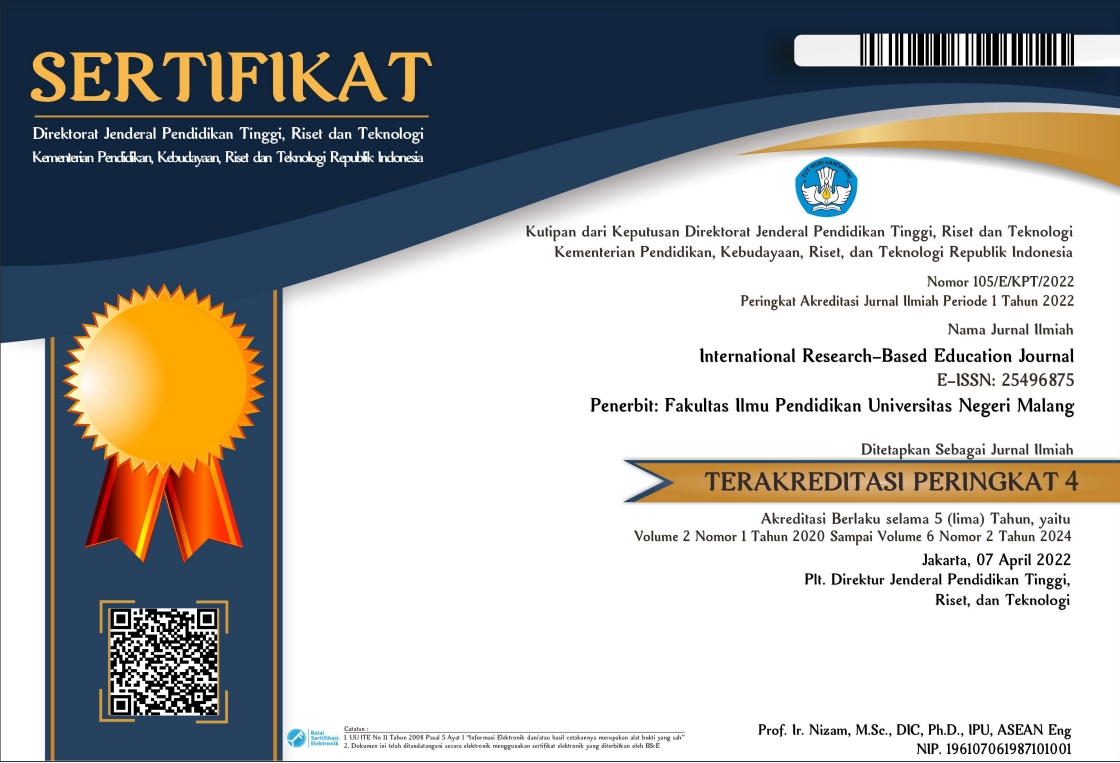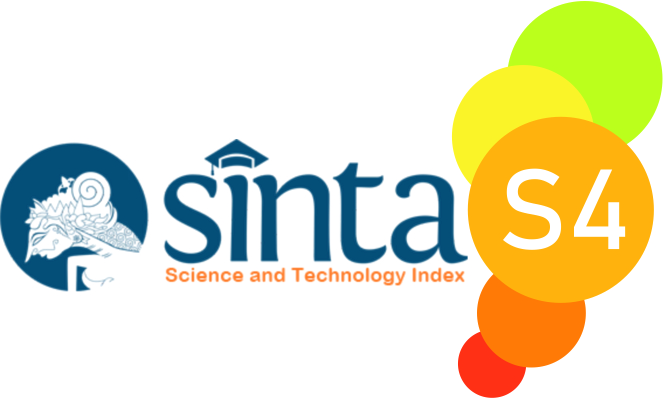Correlation Between Lecturer Professionalism and Self-Efficacy in College Students
Abstract
influence, the influence of school environment (including the characteristics of educators), the transitional situation at school, and self-appraisal skills. Lecturers play important roles for the college students in the process of teaching and learning. To increase the quality of the teaching-learning process in colleges, lecturers are required to enhance their professionalism. The research was aimed to assess the correlation between self-efficacy in college students and college student perception on lecturer professionalism. The research was conducted by college students, batch 2016/2017, Faculty of Psychology, Diponegoro University. There were 175 students distributed in four classes. All classes were selected as the research subjects. Data were obtained using two scales namely EDA (Efikasi Diri Akademik/Academic Self-efficacy) Scale and PTPD (Persepsi Terhadap Profesionalisme Dosen/Perception on Lecturer Professionalism) Scale and were then analyzed using simple regression statistics by means of SPSS Software. The result of the research shows the correlation between self-efficacy in college students and college student perception on lecturer professionalism with the value of r = 0.271 with p = 0.000 (p <.01). The research also indicates that lecturer professionalism contributes 7.3% to self-efficacy in college students. It leads to the conclusion that the dominating factor which influences self-efficacy in college students is not lecturer professionalism. Following factors like self-appraisal, peer influence, and family influence might have greater influence, yet further research is needed.
Keywords: academic self-efficacy, lecturer professionalism, college students.
Keywords
Full Text:
PDFReferences
Akin, A., Akin, U. 2015. Investigating Predictive Role Self-Compassion on Self-Efficacy, Journal of Education and Instructional Studies in The World, 5, 3, 11-19.
Amir, S. 2010. Peningkatan Profesionalisme Dosen. Sukabumi: STAI Syamsul Ulum.
Bandura, A. 1997. Self-Efficacy the Exercise of Control. New York: W. H. Freeman Company
Baron, R.A & Byrne, D.R. 2000. Social Psychology, 9th Edition. Pearson Education.
Blyth,R.,Ceedy,D.K.,Dennis,G.L.,Moyle,W.,Pratt,J.,Vries, S.M.D. 2002. Effect of Maternal Confidence on Breastfeeding Duration-An Application of Breastfeeding Self-Efficacy Theory. Birth, 29, 4, 278-284, DOI10.1046/j.1523536x2002.00202.x.
Brewer, E. W., & Burgess, D. N. 2005. Professor’s Role in Motivating Students to Attend Class.
Butcher, J., Howard, P., Labone, E., Bailey, M., Groundwater Smith, S., McFadden, M. A. R. K. & Martinez, K. 2003. Teacher Education, Community Service Learning and Student Efficacy for Community Engagement. Asia-Pacific Journal of Teacher Education, 31(2), 109-124.
Depdiknas, Biro Hukum dan Organisasi. 2003. Warta Hukum dan Perundang-Undangan, Vol 4, No. 2.
Direktorat Penelitian dan Pengabdian pada Masyarakat. 2002. Kebijakan dan Program Penelitian dan Pengabdian kepada Masyarakat. Jakarta: Departemen Pendidikan Nasional.
Fives, H., & Looney, L. 2009. College Instructors’ Sense of Teaching and Collective Efficacy. International journal of Teaching and Learning in Higher education, 20(2), 182-191.
Hall, R., & Hall, M. 2010. Scoping The Pedagogic Relationship Between Self‐Efficacy and Web 2.0 Technologies. Learning, Media and Technology, 35(3), 255-273.
Hosek, A. M., & Thompson, J. 2009. Communication Privacy Management and College Instruction: Exploring The Rules and Boundaries That Frame Instructor Private Disclosures. Communication Education, 58(3), 327-349.
Iskender, M. 2009. The Relationship between Self-Compassion, Self-Efficacy and Control Belief About Learning in Turkeys University Student. Social Behaviour and Personality. 37(5), 711-720, DOI 102224/sbp.2009.375711.
Kamarudin, W.N.W. & Ibrahim, M.S. 2010. Lecturer Efficacy, Professional and General Competencies of Malaysian Polytechnic Technical Lecturer.
LP2M UNNES. 2015. Rencana Strategis 2015-2019. //http:lp2m.unnes.ac.id.4 Maret 2017
Pajares, F. 1996. Self-Efficacy Beliefs in Academic Settings. Review of Educational Research, 66, 543.
Schunk dan Pajares. 2000. The Development of Academic Self-Efficacy, Chapter of Development of Achievement Motivation. San Diego Academic Press, Wigfield, A., Eccles, J.(ed)
Sharma, H.L, & Nasa, G. 2014. Academic Self-Efficacy Reliable Predictor of Educational Performance, British Journal of Education, 2,3,57-64.
Sukmadinata. 2004. Pengembangan Kurikulum, Teori dan Praktek, Bandung: PT Remaja Rosdakarya.
Tadjudin, M.K. 2002. Sistem Penjaminan Mutu Internal Perguruan Tinggi: Aplikasinya di UI. Disampaikan pada Rapat kerja nasional Pimpinan Perguruan Tinggi Seluruh Indonesia, Yogyakarta.
Tang, T. L. P., & Austin, M. J. 2009. Students’ Perceptions of Teaching Technologies, Application of Technologies, and Academic Performance. Computers & Education, 53(4), 1241-1255.
Watson,D.L. 1986. Social Psychology, Science and Aplication. USA: Scott Foresman and Company.
DOI: http://dx.doi.org/10.17977/um043v1i2p115-121
Refbacks
- There are currently no refbacks.

This work is licensed under a Creative Commons Attribution-NonCommercial-ShareAlike 4.0 International License.










1.png)


